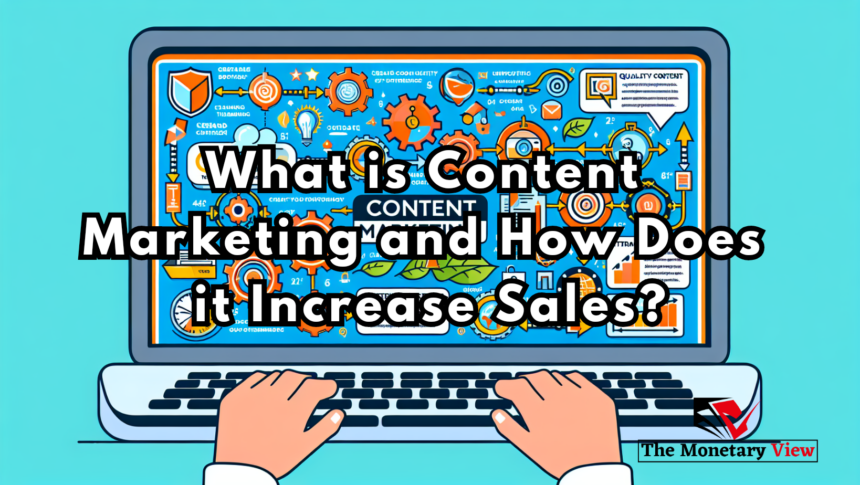Content marketing is a powerful approach that focuses on creating valuable, relevant, and engaging content to attract and retain an audience. Rather than pitching products or services directly, content marketing builds trust by providing information that meets the needs of potential customers. This trust, in turn, can convert leads into loyal customers. In this article, we’ll explore what content marketing entails, its benefits, and how it can significantly boost sales.
What is Content Marketing?
Content marketing involves producing and sharing content that addresses the interests, questions, and pain points of your target audience. Content can come in various forms, such as blog posts, videos, infographics, social media posts, podcasts, and more. The main goal is to deliver valuable information that educates or entertains, building a long-term relationship with your audience instead of aiming for immediate sales.
By offering valuable content, businesses establish themselves as trusted sources in their industries. This builds brand awareness, engages potential customers, and encourages them to choose the brand when they are ready to make a purchase.
Types of Content in Content Marketing
- Blog Posts and Articles
Blog posts and articles are the backbone of many content marketing strategies. They allow brands to showcase their expertise and answer questions their audience might have. Regularly updated blogs help drive organic traffic, boost SEO rankings, and encourage repeat visitors. - Videos
Video content is engaging and highly shareable, making it one of the most effective formats for capturing attention. Explainer videos, product demos, tutorials, and behind-the-scenes glimpses can all help build brand trust. - Infographics
Infographics present complex information visually, making it easier to understand. This format is perfect for sharing data, statistics, or processes and is often shared widely across social media platforms. - E-books and Whitepapers
Long-form content, like e-books and whitepapers, provides in-depth information on a topic. By offering this type of content in exchange for contact information, businesses can generate leads while showcasing their expertise. - Social Media Posts
Social media allows brands to connect with audiences in a more informal setting. Social posts can share quick tips, updates, and promotions while driving traffic back to longer forms of content. - Podcasts
Podcasts are becoming increasingly popular as they allow audiences to engage with content on the go. Through interviews, discussions, and storytelling, podcasts can deepen audience engagement and brand loyalty.
How Content Marketing Boosts Sales
- Increases Brand Awareness
Content marketing introduces your brand to new audiences by providing answers to their questions or offering insights on topics they care about. As people consume your content, they become familiar with your brand, increasing the likelihood of remembering it when they’re ready to make a purchase. - Builds Trust and Authority
When you consistently provide valuable and accurate information, you establish your brand as an authority in your field. Customers are more likely to purchase from brands they perceive as credible and knowledgeable. Content marketing helps build this reputation over time, making it more likely that potential customers will turn to your brand for solutions. - Enhances SEO and Organic Reach
Quality content that’s optimized for search engines helps your website rank higher in search results. By addressing popular queries in your industry, you attract organic traffic to your website, increasing the likelihood of conversion. Search engine visibility not only drives traffic but also establishes your brand as a key player in your niche. - Nurtures Leads and Shortens the Sales Cycle
Through content marketing, businesses can guide potential customers through each stage of the buyer’s journey—from awareness to consideration to decision-making. By delivering tailored content at each stage, you help customers make informed decisions, leading them toward a purchase more quickly. - Generates Social Proof and Engages Audiences
When people share, like, or comment on your content, they help spread your message and generate social proof. Reviews, testimonials, and case studies that highlight customer success stories provide potential buyers with a sense of confidence and trust, making them more likely to convert. - Creates Long-Term Relationships with Customers
Content marketing doesn’t stop once a sale is made. By continuing to deliver relevant content, you keep customers engaged and foster long-term loyalty. Happy and engaged customers are more likely to make repeat purchases and recommend your brand to others, expanding your reach and sales potential.
Effective Content Marketing Strategies to Increase Sales
- Identify and Understand Your Audience
Knowing your audience is the foundation of effective content marketing. Conduct market research to understand their demographics, interests, challenges, and preferences. This knowledge will guide the type of content you create, ensuring it resonates with and attracts the right people. - Create Valuable, Audience-Centered Content
Focus on addressing your audience’s needs and pain points. Use a mix of informative, educational, and entertaining content that provides genuine value, such as “how-to” guides, industry news, or solutions to common challenges. - Optimize Content for SEO
Conduct keyword research to understand what potential customers are searching for online. By incorporating these keywords naturally into your content, you improve your chances of ranking on search engines, driving organic traffic and potential sales. - Use CTAs to Guide the Audience
Every piece of content should have a clear call to action (CTA). A well-placed CTA encourages readers to take the next step, whether it’s subscribing to a newsletter, downloading an e-book, or making a purchase. - Leverage Multi-Channel Distribution
Promote your content across various channels like social media, email marketing, and third-party platforms. By sharing content on multiple channels, you expand your reach and attract a broader audience. - Measure and Refine Your Content Strategy
Use tools like Google Analytics, social media insights, and CRM software to measure the effectiveness of your content marketing. Tracking metrics like website traffic, engagement, lead generation, and conversion rates will help you understand what works best and where adjustments are needed.
Challenges of Content Marketing
While content marketing offers numerous benefits, it does come with some challenges, including the time and resources required to produce high-quality content consistently. Additionally, measuring the direct impact of content marketing on sales can be challenging, especially since it often works over the long term rather than generating immediate sales.
To overcome these challenges, it’s crucial to have a clear strategy, allocate sufficient resources, and maintain patience as you build your content library and establish a brand presence.
Conclusion
Content marketing is a highly effective way to increase sales by building trust, establishing brand authority, and attracting and retaining customers. By consistently delivering valuable content, businesses can engage potential buyers, guide them through the buyer’s journey, and foster long-term loyalty.
For brands willing to invest the time and effort required, content marketing offers sustainable growth and a competitive edge in today’s digital marketplace.







